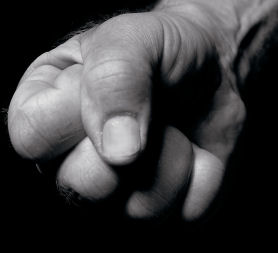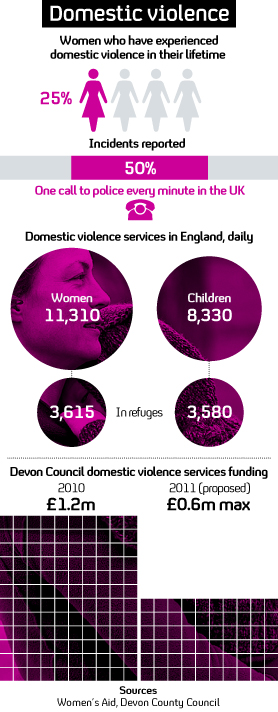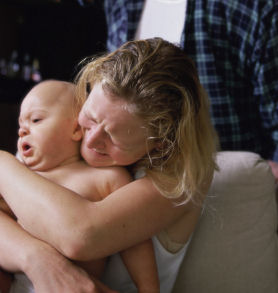Domestic violence services face funding cuts
Exclusive: More than half of domestic violence services across the country do not know if they will be able to remain fully open after March due to funding cuts, Channel 4 News learns.

The spending cuts will inevitably lead to more victims of domestic abuse dying at the hands of their abusers, particularly if they are forced to close, charities have warned.
The problems are also a further hurdle for the Prime Minister’s “Big Society” scheme, aimed at boosting the voluntary sector, which a leading figure in volunteering suggested today could be derailed by spending cuts.
Domestic violence services, which are mainly funded by local authority grants, have been preparing for some level of funding cuts since October’s Comprehensive Spending Review.
But few were prepared for the cuts they are now facing. Services as far afield as Devon, Hull, North Somerset and Nottinghamshire have all been warned there may be no money available for them in 2011 – although a campaign in Devon could see this reduced to 50 per cent and the local councils told Channel 4 News that no decisions were final yet, with a spokesman for Nottinghamshire saying they had “tough choices” and wanted to try and protect existing services.
Without the service, I would have died. There’s no doubt about that. Domestic violence victim speaks to Channel 4 News
Contracts unclear
Early numbers from a survey exclusively obtained by Channel 4 News, done by leading domestic violence charity Women’s Aid, has found that only a quarter of refuges have had their contracts extended beyond March so far. More than one-third of services (37 per cent) say they will either close or face serious risk of closure.
Women’s Aid chief executive Nicola Harwin said that a third had had no information on funding, and most were concerned their funding would be reduced.
Services providing floating support like home and community workers are even worse hit, the survey – which has had 35 responses so far from Women’s Aid member services across the country – found. Only two of 18 have had their contracts renewed for after March, and they do not know what their funding situation will be in 2011.
A quarter of the survey’s respondents said they would have to close one or more services if they lose funding, with 40 per cent warning they would have to cut staff numbers and 20 per cent saying they would have to reduce the number of clients they took on.
Channel 4 News understands there could be funding cuts in areas including Dorset, the Isle of Wight, Nottingham and Liverpool – in some areas up to 50 per cent.
Many councils – including Bradford, Burnley, Essex and Newcastle – are also warning that the services are “under review” and contracts could be renegotiated as they look at council budgets for 2011 – although some have pledged to protect domestic violence services where possible and say efficiency savings can mitigate the funding freeze.
The chief executive of Women’s Aid, Nicola Harwin, told Channel 4 News: “The scary thing is, if domestic violence services are cut, there will be more risk of homicides.
“Two women are killed a week – the cost of a homicide is, on average, £1m. So if you invest in prevention and early intervention schemes, you avoid escalating violence and not only are you saving lives, you’re also saving money.”
Mary Mason is director of Solace Women’s Aid in London: “We are facing cuts of approximately 25 per cent of our income over the coming year – as we work with approximately 4,000 women and children each year this means that 1,000 women and children who received a service last year will not be supported by us.
“At the same time there has been a 25 percent increase in sexual crimes in London over past year. The impact will of necessity be an increase in those accessing statutory services: child protection services, police, housing and health, including mental health services. A small saving of a huge investment in the future leading to huge emotional, health and financial costs in the future. It is Big Society gone very, very badly wrong!”

According to statistics from Women’s Aid, at least 1 in 4 women experience domestic violence in their lifetime. Domestic violence services offer victims a number of support mechanisms – from helplines, to Independent Domestic Violence Advisors (IDVAs), who work with the people most at risk, to the refuges themselves, a last resort for many women and children.
Yvette Cooper, Shadow Minister for Women and Equalities, told Channel 4 News: “Such deep cuts in domestic violence support are truly shocking. These will leave hundreds of women and children at risk of abuse and completely abandoned.
“This is a telling example of how the Tory-led Government’s cuts will hit some of the most vulnerable people in society. Here once again women are being hardest hit. It also shows that far from supporting the voluntary sector, cuts on this scale are damaging the work charities already do to help local communities up and down the country.
“(Home Secretary) Theresa May said tackling violence against women would be a priority for her. If that’s the case, she should explain urgently what she is going to do to help protect these vital services that so many women depend on.”
Funding
Domestic violence is funded through a number of different schemes, which are channelled through local councils by central Government.
A key funding pot is called Supporting People – money aimed at supporting the most vulnerable groups in society. This has an annual budget of £1.6bn across the country. Overall, the money has been protected – the Government has pledged to protect 99p out of every £1 spent on Supporting People last year.
Such deep cuts in domestic violence support are truly shocking. These will leave hundreds of women and children at risk of abuse and completely abandoned. Yvette Cooper, Shadow Minister for Women and Equalities
However, for two reasons, this is not working out across the board. Firstly, the Supporting People money is not ring-fenced, so cash-strapped councils are using the money for other vital services. And secondly, some larger councils have faced disproportionate cuts in their Supporting People fund as as a result of the formula for local council funding.
The Government says it is disappointed councils are not protecting services.
Government statement
"The importance of the Supporting People programme in helping vulnerable people was clearly recognised in the Government's Spending Review. Nationally for every pound of Supporting People funding provided last year, 99 pence will be provided this year. The Home Secretary also announced in November, the allocation of more than £28million for specialist services to tackle violence against women and girls until 2015.
"The Government has maintained the level of Homelessness Grant, and will invest £400m over the next four years. Local authorities can use this money, for example, to fund a sanctuary scheme which can help keep survivors of domestic abuse safe.
"Local authorities have maximum flexibility to use the Supporting People and Homelessness Grants and while we recognise the challenges councils are facing we do expect to see them match the Government's commitment to help the most vulnerable people in society. There is no excuse for councils to be targeting any disproportionate spending reductions on programmes that support the most vulnerable people in their communities."

A spokesperson told Channel 4 News: “Local authorities have maximum flexibility to use the Supporting People and Homelessness Grants and while we recognise the challenges councils are facing we do expect to see them match the Government’s commitment to help the most vulnerable people in society. There is no excuse for councils to be targeting any disproportionate spending reductions on programmes that support the most vulnerable people in their communities.”
While we recognise the challenges councils are facing, we do expect to see them match the Government’s commitment to help the most vulnerable people in society. Government spokesperson
The budgets of many councils are not yet set in stone – with meetings due over February to firm up the numbers. But domestic violence services have seen the numbers – and they fear that the “disproportionate spending reductions” that the Government says it does not want to see are an inevitability.
Domestic violence services
In North Somerset, the North Somerset Against Domestic Abuse group (NADA), could lose its entire £120,000 council grant, the majority of its funding.
Manager Juley Howard told Channel 4 News: “There is no safe way to cut our service. This is an awful situation. We have been warned that all of our funding may not be available – although the council is saying it will try to fund it, but we’re not sure how.
“We’ve helped 3,000 women and children escape domestic violence in the last six months. When you look at these people and the horrible things they are facing, I don’t know how they can cut our funding.”
A council spokesman said the council was facing making £17.5m savings in 2011, and £47.2m over the next four years.
It feels like, in times of plenty, we will consider women’s lives. But in times of less, we will just sweep them under the carpet. Chris Cutland, Chief Executive of Women’s Aid in Nottingham
He said: “As far as the NADA group is concerned, what I have said is that no final decisions on where savings will be made or where the funding axe will fall have been decided. This is part of the budget-setting process which is happening now. All service providers funded through Supporting People grant were contacted well before Christmas to warn them of possible cuts in funding.”
Nottingham Council – which has some of the highest levels of domestic abuse in the country – is also making spending reductions on domestic violence. Last year it spent £900,000, and in 2011 it plans to spend £571,000.
Chris Cutland, Chief Executive of Women’s Aid Integrated Services in Nottingham, told Channel 4 News: “It feels like, in times of plenty, we will consider women’s lives and the impact of violence. But in times of less, when we actually need the services more, we will just sweep them under the carpet.”
Broxtowe Women’s Project, in Nottinghamshire, Against Domestic Violence and Abuse in Devon, and Hull Women’s Aid also told Channel 4 News of their fears of losing funding. In other areas, including Liverpool, no decisions have been made yet over domestic violence. But many fear the worst.
Liverpool City Council’s budget for Supporting People has been cut from £36m to £25m. A spokesman told Channel 4 News there would be “significant change” and “difficult choices”.
He said: “The tricky thing is that a lot of preventative services will end up going because we have to concentrate on people who need support. We have done a lot of early intervention, not just in domestic violence, across the board, because the cost before they fall into the system is less then when they do. But with the cuts we are facing this is not possible. It’s a sad day.”
'I would have died'
"Without the service, I would have died. There's no doubt about that," Louise (not her real name) from Devon, who left her abusive partner 18 months ago with the help of Devon's Domestic Violence and Abuse Service, told Channel 4 News.
"I am hugely grateful to them because one of the things about long-term abuse - I was abused for 24 years - is that you become disempowered and you have a face which you present to the public that everything's fine and great, and everybody thinks that. But then the door closes and it's a different reality. It doesn't matter if you are a judge, a doctor, a seamstress - abuse is there. It is in all walks of life.
"And besides how hard is it to say to the people who were sitting down having dinner with you last week: 'Oh, by the way, every night I live in fear of my life.' They would laugh at you and say don't be silly, he's so nice. And for men it's even more difficult. I was not allowed to make a noise. I had to cook without making a noise, wash up without any crockery noise. If I did it was to deliberately upset my partner, and he would then refuse the food, his dog would bite me, he wouldn't muzzle the dog. It's mental abuse. When I used to drive home from work I would stop on the way to be sick.
"People think - why didn't you leave? But it's a bit like Stockholm Syndrome - it's part of a game, you think you can make it better if you do this better or if you are nice. Each incident you tend to put in a compartment and isolate, but when you begin to take down the compartments you realise 'goodness me this is bigger than I am' and it becomes overwhelming. The first time I rang I actually couldn't speak at all - it was the first time I acknowledged to someone publicly that I had a problem and I now know that's quite common, the inability to speak, just to be in silence or sobbing.
"And then you begin to work with the people on the other end and it's empowering to share, as well as being traumatic. And you realise the enormity of what you're been going through - and some people leave, and some stay with the perpetrator - everybody has different paths.
"I decided to leave. What the helpline did was give me strength, an area that was non-judgemental and could listen and help me make the decision I needed for my life and they kept me safe because I was at risk of losing my life.
"I am still in the bedsit but my life has started again. I work on the helpline now and I'm able to give just a little bit back to perhaps another woman or man in need or support. I feel so strongly we've come such a long way as it is now talked about. It's not as hidden as it was. We mustn't push it back behind closed doors."